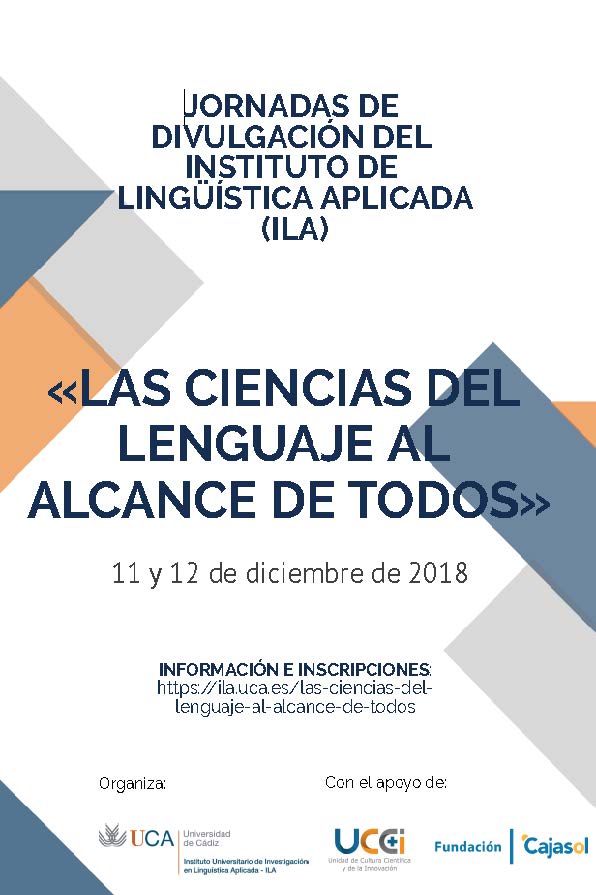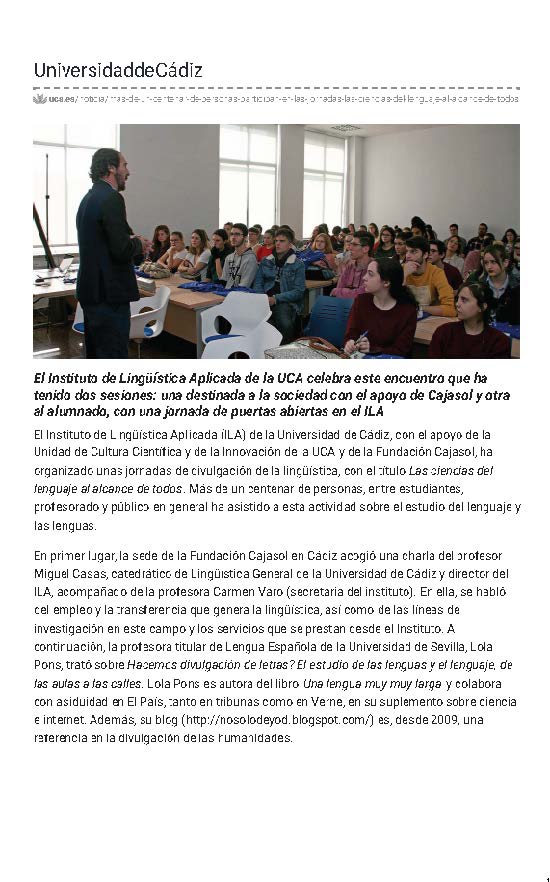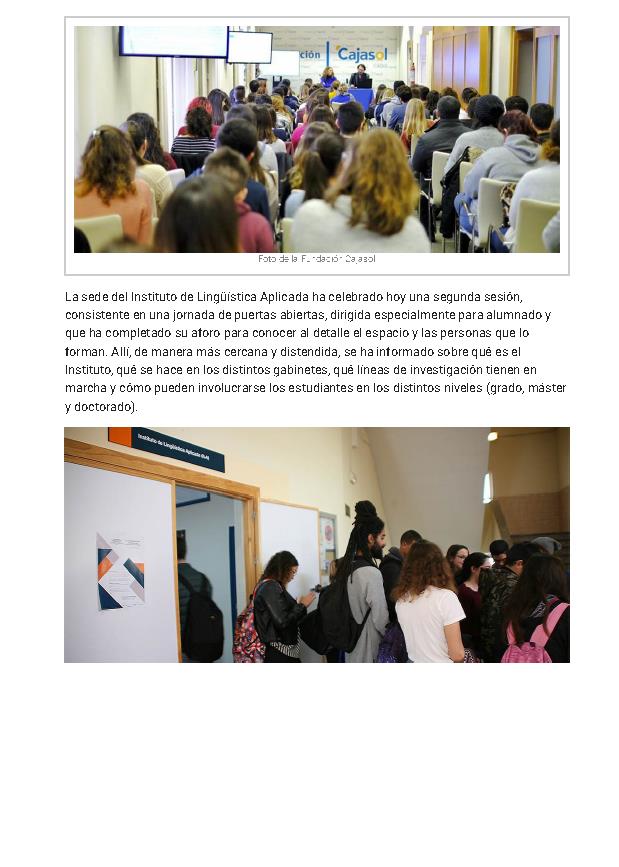Science Outreach Activities
European Researchers’ Night
Date of celebration: 30th of September 2016 in the Alcázar of Jerez.
Our main goal was to bring language research to all those interested in such exciting issues as the origin and evolution of oral and written language, the biological mechanisms that allow us to communicate, the processes of production and comprehension of the world’s speech and languages, and the amazing power of communication in English.
In order to bring language knowledge to the general public and to promote interest in it, several leisure activities were carried out. The activities were complemented with brief explanations for a better understanding and use of them.
The origin of language: how did our communication systems emerge and evolve?
Biology of our language: where do our communication skills reside?
Linguistic detectives: how do we speak and perceive language?
The tower of Babel: How many languages are there in the world?
The magic of English as a bridge between worlds.
Date of celebration: 29th of September 2017 in the San Antonio Plaza in Cadiz.
Our main goal was to bring language research to all those interested in such exciting issues as brain mapping, language acquisition, production, understanding and disorders. Its important relation with society and culture, and the mechanisms explaining how we form, use and combine words, and language creativity, as the technological- applications derived from this knowledge.
We propose playful activities complemented with brief explanations for a better understanding of the activity. These activities revolve around our four offices:
- Speaking brains.
- Live linguistics.
- Create and play with language.
- Linguistic detectives.
Date of celebration: 28th of September 2018 in the Arenal Plaza in Jerez.
Different members representing the ILA participated in the seventh edition of the “European Night of Researchers”, held on September 28th in Jerez, which has allowed us to disseminate scientific studies among citizens in a entertaining way.
The value it brings to research is: a) To bring knowledge about language to all audiences and b) To promote interest in knowledge about language and languages.
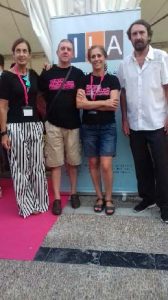
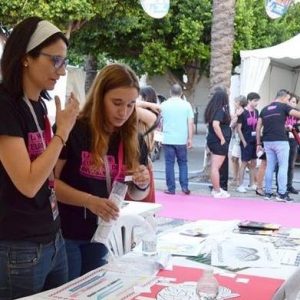
The organized workshops were:
Talking brains
1. Dare to decipher these m3s4gg3s!: Activity to understand language processing.
2. How does our brain talk?: Activity that shows how language depends on the brain. In particular, through these activities, our intention was to bring linguistic research closer to all those who may be curious about such interesting issues as brain localization, acquisition, production, comprehension and language disorders.
Linguistic detectives
In this activity, participants took on the role of the forensic linguist for the elaboration of linguistic profiles. A series of texts were presented together with a group of possible authors and, based on linguistic knowledge, the participants had to find out who had written each of the texts. This activity brings scientific knowledge of language closer to society and shows what language can contribute to such important areas as a police investigation where profiling is required through a text.
English for dummies!
The workshop was divided into the following activities:
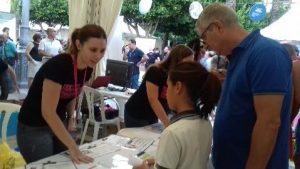
Two interactive Kahoot tests in English to do on your cell phone. These activities are game-based and allow you to review content in English. They are mainly aimed at 10 to 18 year olds.
Trivial English: Activity aimed at younger audiences (5-8 years old), which consists of a board and a giant dice on which children will have to perform different linguistic activities in English to move to the next square. The aim of this workshop is to inform the public about the tasks carried out in the field of linguistic consultancy, such as the following:
-Correction of texts in Spanish.
-Light proofreading (spelling, grammatical and typographical correction).
-Style proofreading (proper use of the Spanish language by means of discourse connectors, subordinate clauses, etc.).
-Proofreading of English texts.
-Light proofreading in English (spelling, grammatical and typographical correction).
-Intense proofreading (proper use of the Spanish language through speech connectors, subordinate clauses, etc.).
-Power Point/oral presentations in English. The activity Crea y juega con el lenguaje (Create and play with language) consists of overcoming a game that has to do with linguistic creativity, in which different exercises are mixed, depending on the age of the audience. Among these activities, we find the formapalabras, lexical creativity, taboo and scattergories.
The aim of this activity is to highlight the importance of linguistic creativity in our language, since sometimes we are not aware of the need to use it, either for denominative or referential reasons, or for expressive or stylistic issues, creating new units that must convey a specific meaning in the speech in search of greater communicative effectiveness.
In search of the lost onomatopoeia
The Corpus Linguistics Department of the ILA is conducting research on onomatopoeias, ranging from the creation of a trilingual corpus (Spanish/French/English) to the creation of an on-line dictionary that will allow us to systematize these units in the three languages mentioned above. With the elaboration of this workshop we intended to disseminate our research by means of several activities focused on children/adolescents that will make them experience first hand the university research, putting it at their fingertips and turning them into authentic and true informants for the collection of empirical data. We proposed among others:
-Activity centered on visual support of comics (without the onomatopoeia) so that the children, from said visual stimulus in which the onomatopoeia is contextualized, reproduce and write the omitted onomatopoeia.
-Activity focused on audio support in which different sounds are offered for the children to complete by writing the onomatopoeia they have heard in that support.

Date of celebration: 27th of September 2019 in the San Antonio Plaza in Cadiz.
Cádiz 300 años de mar
Date of celebration: 19th-22nd of July 2017.
Institute of Applied Linguistics’ scientific dissemination days “Language sciences within everyone’s reach”
Date of celebration: December 11th-12th, 2018.
This activity, held during November the 11th and 12th, was very well received by students and teachers in the field of Humanities.
